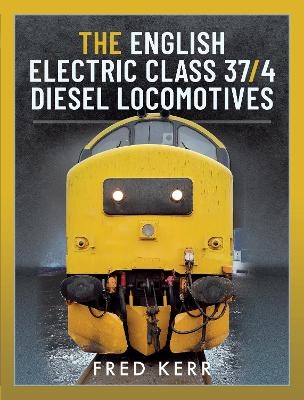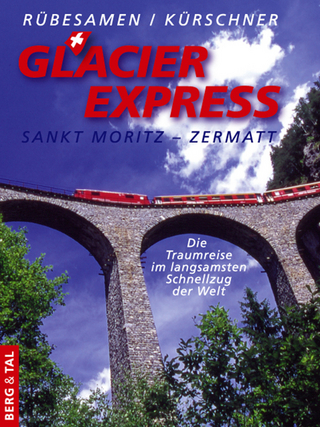
The English Electric Class 37/4 Diesel Locomotives
Seiten
2022
Pen & Sword Transport (Verlag)
978-1-3990-9613-3 (ISBN)
Pen & Sword Transport (Verlag)
978-1-3990-9613-3 (ISBN)
Details how the Class 37/4 came into being and the duties undertaken by the Scottish/Welsh fleet.
In the prelude to the privatisation of BR the Provincial Sector (later Regional Railways) became responsible for local / secondary train services and initiated the refurbishment of 31 Class 37 locomotives, fitted with train heating equipment - hence designated Class 37/4 - to support the shortfall of DMU trainsets. Their initial task was to work services on Scottish lines radiating from Inverness to points north and Glasgow to service the West Highland Line with a small batch based in South Wales to service Cambrian Line services and services from Cardiff traversing the Marches Line to serve Liverpool.
These services were soon replaced by Sprinter trainsets thus releasing the fleet to other duties including freight operators hence, at privatisation in April 1994, the fleet became owned by freight companies who subsequently hired locomotives to both other freight companies and passenger operators.
Throughout their working life the fleet members have proved invaluable and capable of powering a variety of services whose history confirms both the locomotives' adaptability and prowess in handling the duties allocated to them.
Fred Kerr's book seeks to show this adaptability by detailing the reason for their initial creation and the tasks successfully undertaken once released from their initial roles as support for the shortage of DMU trainsets. The advent of privatisation saw an increased demand for their go-anywhere do anything' ability which is also displayed by the range of photographs that illustrate the wide range of duties performed by class members.
Once withdrawn from service some class members were purchased for preservation and - such was their adaptability - that preserved examples were hired by train operators to cover duties that no other class of diesel locomotive was capable of achieving.
In the prelude to the privatisation of BR the Provincial Sector (later Regional Railways) became responsible for local / secondary train services and initiated the refurbishment of 31 Class 37 locomotives, fitted with train heating equipment - hence designated Class 37/4 - to support the shortfall of DMU trainsets. Their initial task was to work services on Scottish lines radiating from Inverness to points north and Glasgow to service the West Highland Line with a small batch based in South Wales to service Cambrian Line services and services from Cardiff traversing the Marches Line to serve Liverpool.
These services were soon replaced by Sprinter trainsets thus releasing the fleet to other duties including freight operators hence, at privatisation in April 1994, the fleet became owned by freight companies who subsequently hired locomotives to both other freight companies and passenger operators.
Throughout their working life the fleet members have proved invaluable and capable of powering a variety of services whose history confirms both the locomotives' adaptability and prowess in handling the duties allocated to them.
Fred Kerr's book seeks to show this adaptability by detailing the reason for their initial creation and the tasks successfully undertaken once released from their initial roles as support for the shortage of DMU trainsets. The advent of privatisation saw an increased demand for their go-anywhere do anything' ability which is also displayed by the range of photographs that illustrate the wide range of duties performed by class members.
Once withdrawn from service some class members were purchased for preservation and - such was their adaptability - that preserved examples were hired by train operators to cover duties that no other class of diesel locomotive was capable of achieving.
Fred Kerr is a photographer whose lifelong interest in railways began in Edinburgh during the early 1950s and has continued throughout his life since. His early ventures into photography began in 1961 but became established during his University years in the early 1970s. Taking early retirement in 1994 he has spent time working for Colin Garratt, a muse whose inspiration provided opportunities to photograph railway scenes that have proved to be historic as the railway undergoes changes in both its structures and operations.
| Erscheinungsdatum | 01.11.2022 |
|---|---|
| Zusatzinfo | 250 colour pictures |
| Verlagsort | Barnsley |
| Sprache | englisch |
| Maße | 216 x 282 mm |
| Themenwelt | Natur / Technik ► Fahrzeuge / Flugzeuge / Schiffe ► Schienenfahrzeuge |
| ISBN-10 | 1-3990-9613-3 / 1399096133 |
| ISBN-13 | 978-1-3990-9613-3 / 9781399096133 |
| Zustand | Neuware |
| Haben Sie eine Frage zum Produkt? |
Mehr entdecken
aus dem Bereich
aus dem Bereich
die Rhätische Bahn schreibt Geschichte
Buch | Hardcover (2023)
Edition Somedia (Verlag)
59,00 €
St. Moritz – Zermatt : die Traumreise im langsamsten Schnellzug der …
Buch | Hardcover (2023)
Verlag Berg & Tal
14,95 €
Betriebsmaschinendienst, Einsatz bei den Bahnbetriebswerken und …
Buch | Hardcover (2024)
EK-Verlag
54,00 €


